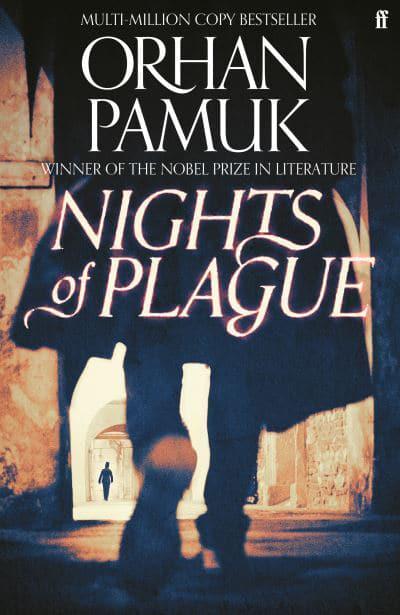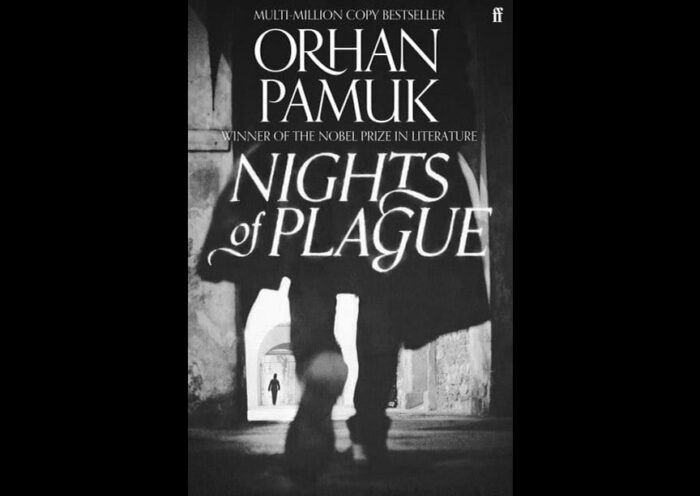Reviewed by Richard Rose
Nights of Plague
by Orhan Pamuk
Published by Faber | ISBN: 978-0-571-35292

Though it is not always true to suggest that from adversity comes great literature, there are many instances where extreme circumstances have led to a deluge of writing, good, bad and indifferent. Obvious examples, such as the first world war, from which emerged some of the finest poetry of the twentieth century providing a visceral and lasting impression of the horrors of conflict, were vividly expressed in the works of Wilfred Owen, Ivor Gurney and Erich Maria Remarque to name but three. Later conflicts were equally well documented by writers such as Laurie Lee, George Orwell, Norman Mailer and Stephen Wright. What all of these works have in common is the ability to demonstrate the futility of man-made tragedy and what Hannah Arendt with great prescience described as the “banality of evil”.
While the causes of disease and infection are often less easily defined, responses to plague and pandemic have given us a rich vein of literature over many centuries. The fourteenth century writer Giovanni Boccaccio in his great work “The Decameron” captured the fear of the Brigata as they sought to escape the ravages of plague, much as he had done with his movements across Italy. Three hundred years later in his “Journal of the Plague Year” Daniel Defoe provided a vivid account of life during the epidemic that ravaged London in 1665. In “Pale Horse, Pale Rider,” Katherine Anne Porter explored love and loss during the influenza epidemic of 1918 that claimed more lives than the first world war. Later writers including Gabriel Garcia Marquez in “Love in the Time of Cholera” in which the lovers Fermina and Florentina provide a personal response to the fear of disease, and Albert Camus who provides vivid descriptions of life under lock-down in the French Algerian city of Oran, have provided rich accounts of earlier times of pestilence.
It was then, only to be expected that a modern global pandemic, and more especially one that has taken place in the glare of the world’s media, might attract the attention of today’s writers. In the UK, poets, including Simon Armitage, Roger McGough and Hollie McNish reflected on the impact of Covid-19 on their own lives. As might be expected, it is this personalisation of a devastating period of history that has led to much of the writing to emerge thus far from the experiences of the last few years.
The Nobel Laureate Orhan Pamuk in his latest novel “Nights of Plague” has adopted a refreshingly different approach. By deftly mingling fantasy with history, he has created a Mediterranean story located on a fictional island during the declining years of the Ottoman empire. Pamuk is of course rightly renowned for his interplay of the imaginary with reality. His Museum of Innocence is a real place located in his native Istanbul but contains artefacts linked exclusively to characters from his imagination. In his latest work Pamuk has created the island of Mingheria and even provides his readers with a map to show its location off the Northeast shoreline of Crete, one of the many real places that figures strongly in the text.
Through the telling of a slow burning tale that perfectly captures the tedium of life under quarantine, Pamuk interrogates the very nature of a disease that challenges the understanding of the scientists of the day; Dr Nuri Bey a quarantine expert and the most sympathetically handled character in the bookt, struggles to interpret the ravages of the disease that engulfs Mingheria. In his efforts to deploy a logical approach to tackling the devastation that surrounds him, the doctor comes to appreciate that the island’s population are looking for easy answers that have minimal impact upon their daily routines. Trading a fine line between the diplomacy that will keep the local politicians on side and the implementation of scientifically justified measures to tackle the plague, he presents as a conflicted man under considerable duress. Here, Pamuk has created a character with whom anyone who has witnessed tensions during the management or mismanagement of Covid-19 will immediately empathise. With a subtle combination of humour and commentary, he also demonstrates how seemingly rational individuals quickly descend into a world of pseudo-science and mystical mumbo-jumbo in their response to situations they don’t understand. The carrying of religious texts and the use of untested potions in an effort to ward of the plague demonstrates irrationality akin to the notion of injecting bleach to tackle Covid-19.
As the book progresses Mingheria gradually falls further into a state of decline. Debates around the efficacy of quarantine and the ways in which this may be enforced dominate several chapters. The tensions that develop between central characters, with politicians reluctant to take advice from scientists and religious leaders defying the laws of the land, have a familiar ring. But it is the eventual political collapse towards anarchy, with the overthrowing of democracy through varying forms of insurrection that many readers will be led to consider as being on the cusp of fantasy and reality.
An exiled Princess, who turns out to be one of the most grounded characters in this book, is forced to reconsider many of her relationships. Not least that to her trusted bodyguard, a man who starts out as a humble major, but through circumstance, scheming and personal manipulation of the tragic situation, eventually assumes the role of supreme dictator of the island. Unsurprisingly he comes to a sad end. Here again, Pamuk plays with our emotions as a once sympathetic character is revealed to be a despot who loses the trust of the fictional people who surround him, and thereby also alienates the reader. The theme of an attempted overthrow of democratic institutes and the ease with which an ordered society descends into chaos will certainly resonate with many who read this book.
Pamuk has always had the ability to create places and situations that are both vivid and tense. In this latest novel, as in “My Name is Red” and “The White Castle” he demonstrates the influences of the once powerful Ottoman empire, and the ways in which along with other imperialist ventures these are invariably doomed to gradually fade. He is equally adept as demonstrated in books like “Snow” at weaving social and political commentary and reflection upon modern day incidents into stories that resonate across cultures. At times there are aspects of “Nights of Plague” that seem repetitious, with characters who are indecisive and at times inept. Conspiracy theories and false prophecies abound. But then, perhaps these are phrases that may be aptly used to describe the period of our most recent global pandemic.
Richard Rose, November 2022
BIO
Richard Rose is a UK based writer and university professor. His most recent books include “Breaching the Barriers: Short Stories and Essays from India” and a collection of poetry “A Sense of Place”. “The Artist’s Model and Other Stories” will be published in early 2023.















